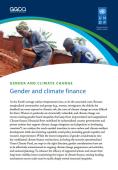
As the Earth’s average surface temperatures rise, so do the associated costs. Because marginalised communities and groups (e.g., women, immigrants, the elderly, the disabled) are more exposed to climatic risk, the costs of climate change are more difficult for them. Women, in particular, are structurally vulnerable, and climate change can worsen existing gender-based inequities that keep them impoverished and marginalised. Climate finance (‘financial flows mobilised by industrialised country governments and private entities that support climate change mitigation and adaptation in developing countries’) can catalyse the much-needed transition to zero-carbon and climate-resilient development while also fostering equitable social policy, including gender equality and women’s empowerment. While the recent integration of gender considerations into key multilateral climate finance mechanisms, including the recently operationalized Green Climate Fund, are steps in the right direction, gender considerations have yet to be effectively mainstreamed in ongoing climate change programmes and activities, and national planning.
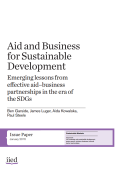
The year 2015 was pivotal in moving towards a fairer, more sustainable world. The global Sustainable Development Goals and the Paris Conference of the Parties (COP21) to the UN Framework Convention on Climate Change aimed to address some of the greatest challenges facing humanity, including climate change, environmental degradation and the persistent disparity between rich and poor.
To deliver on the post-2015 agenda, it is clear that traditional forms of development aid will no longer be adequate and that new forms of governance, partnerships and financing – particularly between public, private and informal economy actors – will be required.
This report draws on a series of case studies to consider what works, bringing together an initial evidence base to help inform effective aid and business interventions for sustainable development, with a particular focus on those which involve and support small- and medium-scale businesses.
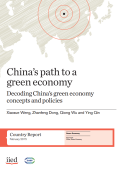
China’s transition to a green economy has immense implications for sustainable development both domestically and worldwide. Yet China’s green economy policies, concepts and actors still remain poorly understood in the emerging international discourse on the green economy.
This report serves as an introductory guide to China’s green economy thinking by i) tracing the evolution of China’s green economy thinking of the last 40 years, ii) mapping key macro policies that shape China’s green economy prospects today, iii) identifying relevant sectoral policies and players in finance, environmental industry, energy, forestry, urbanisation and industrial production, and iv) examining stakeholder groups, unique traits and areas for further exploration.
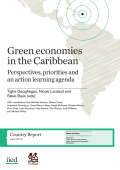
Growing financial, climate and social challenges in the Caribbean have sparked the search for new economic pathways that would better serve the region.
This paper summarises early explorations by the Green Economy Action Learning Group (GE ALG), an independent and Caribbean-driven initiative which aims to help governments and other stakeholders develop a practical Caribbean vision of an inclusive and resilient ‘green’ economy. It pulls together background papers from ALG members, revealing diverse regional, national, local and sector perspectives on green economy progress, needs and prospects.
An ‘action learning’ agenda is proposed as a way to evolve green economy pathways in three areas: SMMEs; ‘triple bottom line’ reporting across public and private sectors; and multi-stakeholder mechanisms for developing green economy policy.
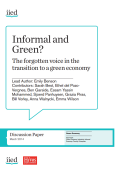
'Inclusive green growth' is no longer just a buzz term. It is shaping donor priorities, influencing national development plans and attracting investment. Yet inclusive green growth policies commonly promoted by international institutions make little, if any, reference to informal economies - which are expanding in all parts of the world in response to changes in our formal economies - and which cater for the world's poor. What does Green Economy mean in the context of informal markets where the world's poorest and most vulnerable people produce and trade? Does 'greening' necessitate formalisation, or can it happen through people's own actions?
